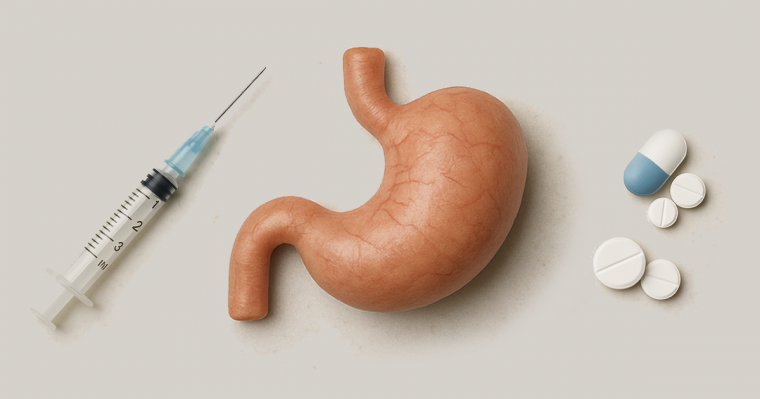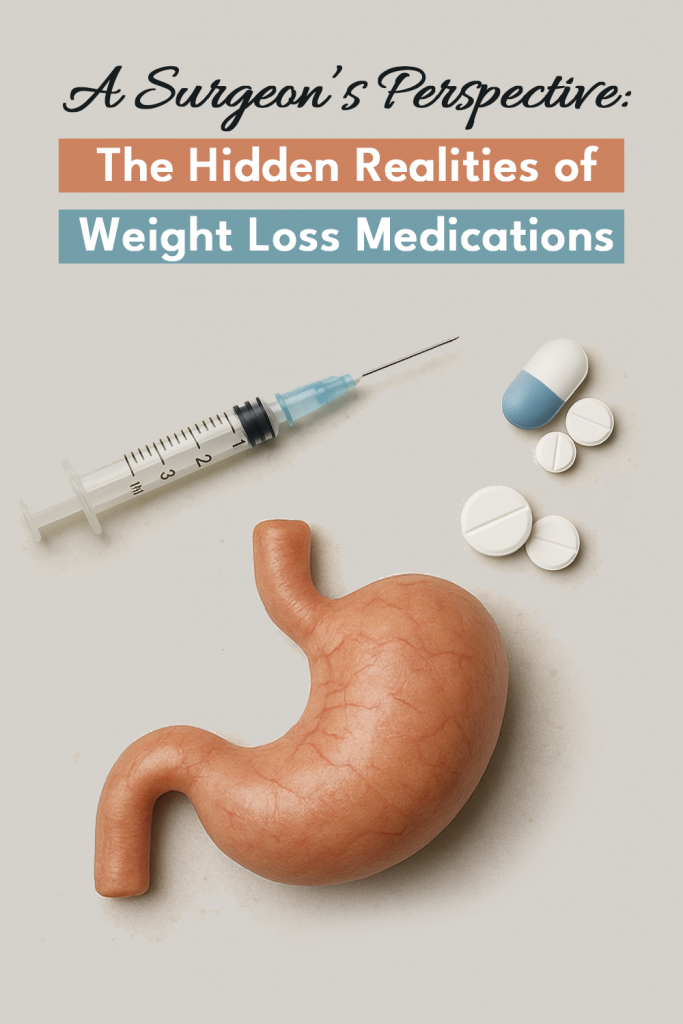
A Surgeon’s Perspective: The Hidden Realities of Weight Loss Medications
August 25, 2025I recently had the pleasure of doing a TedX Talk on The Hidden Realities of Weight Loss Medications. If you’ve turned on the news or scrolled through your feed lately, chances are you’ve heard about the new wave of so-called “miracle” weight loss medications. These GLP-1 agonists, hailed as revolutionary, are changing the landscape of obesity treatment. But the story isn’t as simple—or as magical—as it may seem.
Yes, they work for many people, and the results can be dramatic. But they also have some not less than desirable outcomes as well. And at their current pace and pricing, these medications have the power to financially devastate the U.S. healthcare system. That’s not an exaggeration—that’s math.
Over the past 24 years, I’ve witnessed firsthand the devastation obesity can cause—and the transformations that can occur when it’s properly treated. I’ve seen marriages saved, new lives created, and chronic diseases reversed. And I’ve also seen the pain, the failure, and the unrelenting emotional toll.
Two things have become abundantly clear over the decades:
- The obesity epidemic in America is getting worse.
- The financial burden it places on our healthcare system is unsustainable.
Let’s start with the big picture. More than one in three Americans is now classified as obese. Last year alone, the U.S. spent $173 billion treating obesity and its associated conditions. In fact, this disease has been cited as a driving factor in bankrupting multiple state healthcare systems. Over the last 20 years, insurance premiums have tripled, and a significant portion of that increase is due to the rising costs of treating obesity.
So what’s working to combat it?
The two most impactful treatments for obesity that we’ve seen in the past 30 years are GLP-1 medications and weight loss surgery. In this article, I’ll compare these two powerful tools—how they work, what they cost, and what they actually deliver.
The Economics of Obesity Treatment
Let’s talk dollars and sense—based on current name-brand GLP-1 pricing and self-pay gastric sleeve price at Nicholson Clinic.
- GLP-1s: $15,600 per year. Every year. Potentially for life.
- Weight Loss Surgery: $10,500 one-time cost. No recurring drug expense.
If just one-third of the U.S. population (those who are obese) were to use GLP-1s at current costs, the annual expense would total $1.73 trillion. That’s a 35% increase in the entire U.S. healthcare spend from last year—on just one drug class.
Even if insurance covers the medication, it’s still somebody’s money—employers, taxpayers, or state and federal programs. Meanwhile, studies show that weight loss surgery pays for itself within 18 months through decreased medical costs and increased workforce productivity.
How Do They Actually Work?
GLP-1 medications mimic a hormone that reduces appetite. They’re effective, but they require lifelong use to maintain results. And about 1 in 3 patients don't respond well.
Weight loss surgeries, especially modern procedures like sleeve gastrectomy and gastric bypass, go even further. They increase GLP-1 levels in the body naturally—up to three times more than the drugs do. Plus, the anatomy is altered, and the size of the stomach is reduced; therefore, the amount of food volume that can be ingested is also reduced. Surgery typically results in:
- Greater weight loss
- Better long-term sustainability
- More effective resolution of related diseases like Type 2 diabetes, hypertension, and sleep apnea
- Far lower cost over time
In fact, to this day, weight loss surgery remains the only known cure for Type 2 diabetes.
The Bigger Picture
So why are so many people clamoring for these drugs?
Because obesity is not just about health. It affects relationships, careers, mental health, and self-worth. People want hope, and they’re willing to pay for it.
But here’s the issue: we’ve treated obesity like a character flaw rather than a disease. If someone has high blood pressure, we don’t shame them for needing medication. But when someone seeks help for obesity, society still whispers judgment.
It takes courage for patients to seek weight loss surgery. That courage should be met with compassion, science, and solutions. Not stigma.
What Needs to Change
We don’t have all the answers. But we’ve identified the problem. Now we need to fix it. And that will require:
- Education: to change public perception
- Research: to find more sustainable solutions
- Policy reform: to ensure access doesn’t bankrupt the system
- Compassion: to treat patients with the dignity they deserve
Can you imagine a world where obesity is no longer a source of shame but simply a chronic disease managed like any other? That’s the world I’m fighting for.
Because this journey—this battle against obesity—is not a sprint. It’s a thousand-mile journey. But the first step is understanding. If you are struggling with your weight, please schedule a consultation with an experienced bariatric surgeon to see how you can achieve lasting results.

 | ABOUT THE AUTHOR Dr. Nick Nicholson is one of the nation’s leading bariatric surgeons. He’s been performing weight loss surgery since 2001 and has helped patients from ALL 50 states and 11 countries. He leads a team of top surgeons specializing in Sleeve Gastrectomy, Gastric Bypass, SADI-S, Duodenal Switch, LAP-BAND, Revisions, Gastric Balloon, and abdominal surgery such as gallbladder removal, abdominal wall hernia repair, and hiatal hernia repair to treat acid reflux. He practices out of the Nicholson Clinic for Weight Loss Surgery. |



